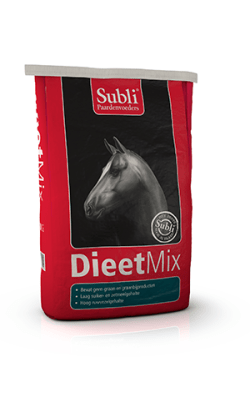Healthy old horses also need modified feed
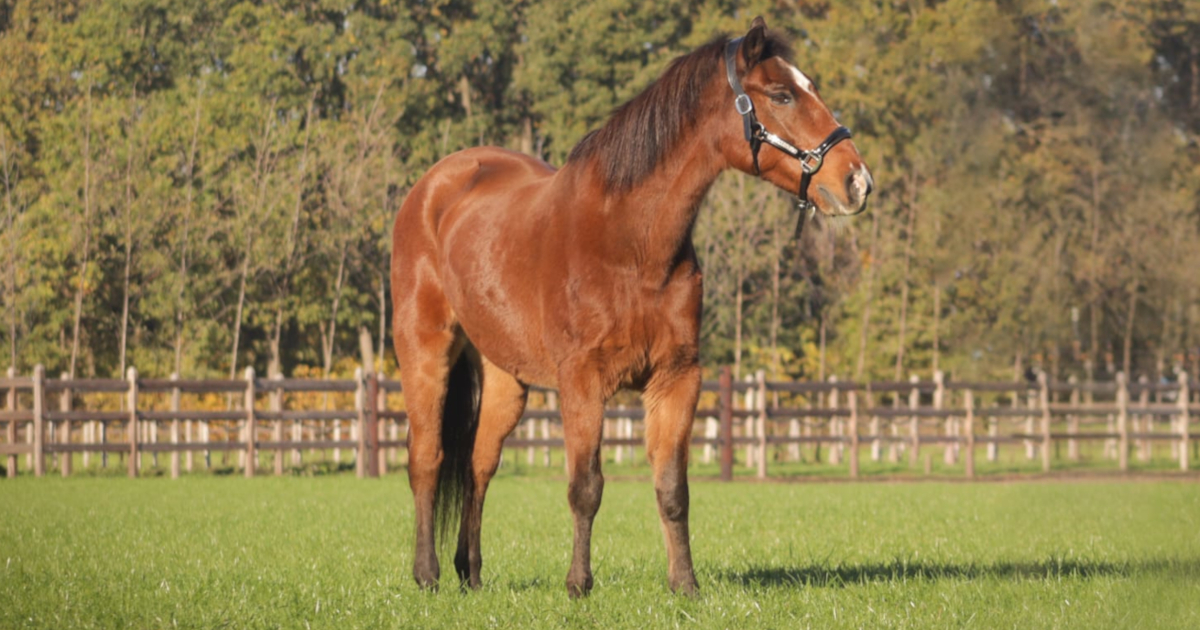
The 39-year-old Sebas of horse farm the Smulhoeve, big fan of Subli Seniores Priores
When you think of an older horse, you probably have a certain image of it. A less tight topline, slightly leaner on the ribs and some roughage crammed in front of the box door. Our nutritionist Wendy Warmerdam explains how the horse's body and associated feed requirements change.
Chewing becomes more difficult
Wendy: "When a horse gets older you see changes in the teeth. The molars wear down more and the horse cannot chew as well. Furthermore, you often see some muscle deterioration, which includes the chewing muscles. Grinding the food is therefore less easy and less saliva is produced. This makes it more difficult to digest the feed properly. In addition, older horses swallow larger chunks of feed which can cause esophageal blockage. Further down the digestive tract, things can also become more difficult. You then often see undigested food back in the manure. This is just the beginning of the digestive problems, as these horses can still absorb roughage. When this too becomes more difficult, the challenge of getting all the nutrients needed really begins."
Calcium-phosphorus ratio changes
"With the decline in muscling, the need for easily digestible protein becomes higher. You also see things happening in the bones; for example, there may be osteoarthritis. Calcium and phosphorus are important minerals for bones. The right calcium-phosphorus ratio is particularly important here. In older horses, you see the phosphorus requirement becoming higher than the calcium requirement. So make sure that you don't give too much calcium anymore, but offer enough phosphorus. You can't see the effect on the outside, because this is really about the bones. Extensive research has shown that changing requirement."
Increased need for energy and vitamins
"With an aging horse, energy requirements increase. Older horses have a little more trouble staying at temperature in cold weather. Therefore, in the winter you need to give them sufficient
offer energy so they can keep themselves warm. When horses are cold, you see them expand their fur. If you feed too little energy over a long period of time, you will see those horses lose weight. Furthermore, it is important to include extra antioxidants in the diet. By doing so, you offer the horse's body additional protection against the natural aging process. Vitamin C is an important antioxidant, as are vitamin E and selenium."
Subli Seniores Priores
"Subli has for almost twenty years Seniores Priores in its range, a unique forage and concentrate replacement in one. To determine the composition
has been analyzed whether all the needs of horses that can no longer take in roughage are covered at the end of the day. The product has continued to evolve: today it contains less sugar and starch and more energy. The amount of vitamins has also been adjusted. So with one feed product you can give your old horse everything it needs. Seniores Priores can also be used as a supplementary feed. This does require a different feed recommendation than the feed recommendation for horses that no longer absorb roughage."
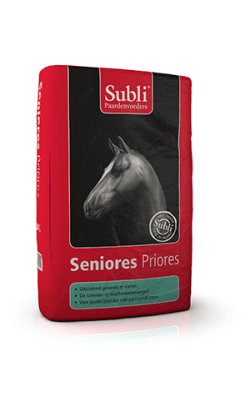
Experience from Paardenboerderij de Smulhoeve
"39-year-old Sebas has been with us at the Smulhoeve since he was two years old. Now that he is getting older, his teeth are getting worse and he can no longer eat hay properly and makes a lot of cramming. With Seniores Priores, however, he stays fit and happy. We give him 9 scoops daily, divided into 3-4 servings, and he still enjoys standing in the pasture every day. Seniores Priores ensures that he, like our other oldsters over 30, can grow old healthily."
Continue to offer forage
"Seniores Priores is a product that you feed wet and lacks the fiber length of roughage, so horses won't chew it for long. So we always advise offering roughage anyway, even if he can no longer absorb it well. This is because chewing movement and salivation are very important. You can, however, adjust the roughage. For example, give softer or leafier roughage instead of stalky roughage, which is easier to chew and is crushed earlier. A horse can then still absorb some nutrients from that."
Wet feeding
"Seniores Priores should not be fed dry but should be soaked for a few hours. Beet pulp is an important raw material in Seniores Priores and has the property that it expands when water is added. When you feed it dry, it only becomes moist when the horse chews and swallows it, this can cause it to expand in the esophagus, with all the unpleasant consequences. Seniores Priores must soak for at least four hours before you feed it. It's fine to soak it in the morning before feeding it in the evening, but make sure the feed is covered and in a cool place."
Subli Diet Mix - much more than a diet product
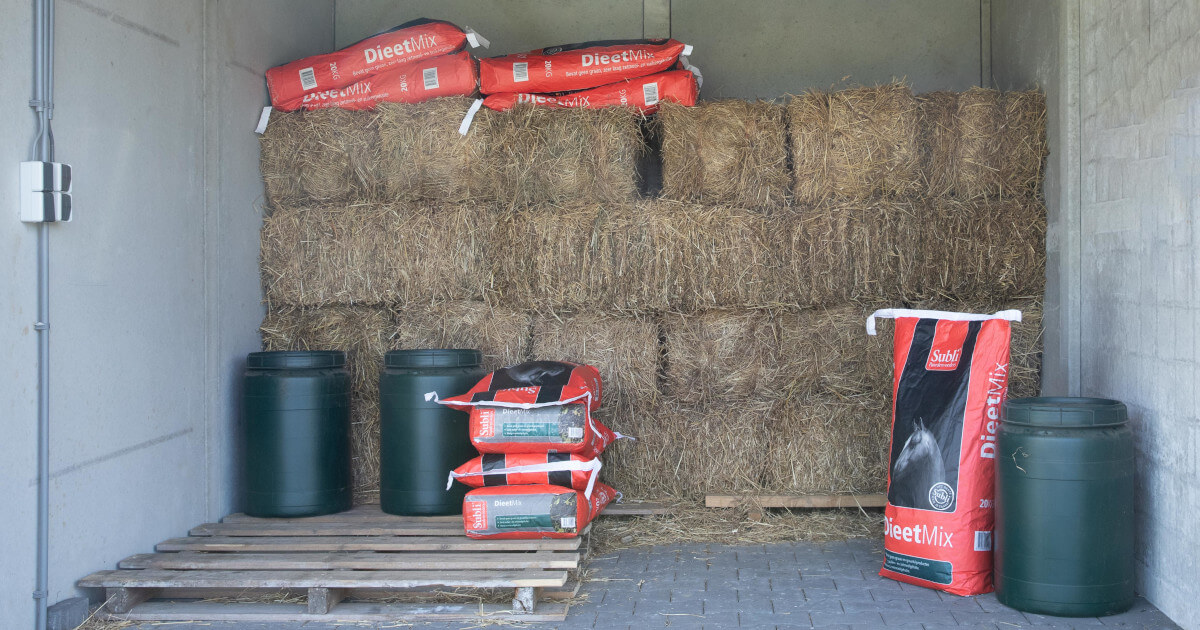
Subli Diet Mix is ideally suited to help overweight ponies (and, of course, horses) lose weight. This diet feed is low in sugar and starch because it contains no grains, grain products or molasses, but it does contain the oh-so-important vitamins. Subli Diet Mix was developed to help horses lose weight in a healthy way. However, what many people do not know: due to its special composition, it is Subli Diet Mix multi-purpose.
Any horse can become overweight
Thinking about obesity in horses, many horse lovers get one of those fat Shetland ponies in mind. But there are more breeds that easily become one size overweight; think Fjords, Haflingers, Tinkers, Friesians and Icelanders. These are "frugal" breeds that have efficient digestion and thus can get by on less nutrition. If you feed these horses like higher bloodstock, they become overweight faster. With these horses, conformation and disposition are partly to blame for the fact that they easily gain a few pounds, but many warmbloods are also a touch on the fat side these days. It seems like the image that owners or handlers have of an average horse's body condition is shifting a bit. If you look at how we keep horses today - we want to take the best care of them, keep them partially stabled and like to give them something tasty - it is fair to say that many horses are at risk of becoming overweight. In the winter when they are stabled a lot, but certainly also in the spring when the grass starts to grow. In any case, it is extremely unwise and even life-threatening to leave a horse on a pasture of fresh grass for too long. Build up grazing slowly and make sure that your horse cannot graze indefinitely.
How can you make a fat horse lose weight?
Simply giving less feed is not good for your horse, but it is also not always healthy. Especially horses and ponies that don't have to do much work don't need much energy, but they do need protein. Protein is necessary to build muscle. If a horse has too little protein in its ration, it will lose muscle mass. That is why it is, also if your horse needs to lose weight, important to give him good nutrition. With Subli Diet Mix, your horse can have that meal every day that makes him so happy, but he does not get too much energy and enough protein to maintain his muscles. Moreover, it contains vitamins; all horses and ponies need vitamins for a good resistance. So you can make an important contribution to a healthy weight of your horse by giving him good nutrition.
"Let food be your medicine"
"Let food be your medicine and your medicine be your food." This statement by Hippocrates - the founder of modern medicine - has been a truth like a ... horse for some 2,500 years. Especially when you are sick, you need good nutrition, which can help you get back on your feet. This is just as true for horses as it is for humans. Osteoarthritis, for example, is an extremely painful and life-threatening condition that occurs regularly in, among others, that fat Shetlander we mentioned earlier in this story. But basically any horse can be affected by it. A major cause of laminitis is fructans; substances found in grass (and thus hay). Fructane-rich roughage can exacerbate the metabolic problems that can cause laminitis. Therefore, Subli Diet Mix - which contains hardly any sugar and starch - can provide valuable support for horses with laminitis.
Disease support
Subli Diet Mix can also be used in horses with, for example, muscle paralysis, insulin resistance, PPID (Cushing's disease) and EMS (Equine Metabolic Syndrome). EMS is a collective term for a number of diseases, including insulin resistance, obesity, fat deposits in specific locations and laminitis. We also see localized fat deposits, IR and laminitis in horses with PPID. Horses with EMS react more violently to protein. These horses need adequate protein intake, but not excess. Protein must also be of high quality. Alfalfa in Subli Diet Mix is an example of high-quality protein.
For horses with insulin resistance (and laminitis), it is important to avoid grains and concentrates. Subli Diet Mix does not contain grains and grain by-products. It is also recommended for these horses to limit grazing and feed coarse (stalky) hay. This limits any fructan intake and energy intake (in connection with obesity). Subli Diet Mix, as a high-fiber muesli, is a good addition to the coarse-stemmed hay for these horses.
What if your horse just needs to get fatter?
If a horse is too thin and needs to regain some weight, you can feed him with Subli Diet Mix. The proteins and vitamins in this diet feed provide healthy support for horses that could use a little extra help. A horse can be too thin because he is not getting enough feed, but also because of poor quality feed or a shortage of minerals, vitamins and trace elements. Poor teeth, worms and/or parasites may be another cause. Finally, the horse may consume more energy due to heavy labor, its age (young animals in growth) or the stage of life it is in (think of a lactating mare or a stallion at stud) than it can take in with its feed. Generally speaking, if a horse is sick, his body needs energy to recover. Then Subli Diet Mix can be a supplement to the ration. Because of the building blocks (amino acids from proteins) and minerals, vitamins and trace elements. Therefore, in addition to grazing, Subli Diet Mix would be a great fit for a horse that just needs to gain some weight.
Nutrition for horses with mandatory box rest
If you give a lean horse only Subli Diet Mix in addition to roughage, for example, there is a chance that he will lack some energy. But a horse that has to rest in the box with a tendon injury, for example, will certainly benefit from Dieetmix. Because this feed is low in energy, but does provide high-quality protein and contains enough vitamins, minerals and trace elements to support recovery. You don't want to feed such a horse too high in energy, because then - after several weeks of mandatory stall rest - he may find himself over the box wall.
Super-healthy sports ration
Do you have a horse that does a lot of work? To horses that are competing in sports or that can be taken out several times a week for a long ride under saddle or in front of a carriage, you can give Subli Diet Mix together with linseed oil or linseed meal. Subli Omega 369. This provides extra energy and so you put together a super healthy sports ration that gives your horse energy, protein and vitamins.
Want to know more or get customized nutritional advice?
Is your horse too fat or just too skinny? Are you looking for more information about Subli Diet Mix or any of our other products, or would you like to nutritional advice from one of our specialists? If so, please contact us without obligation at info@subli.nl or call to 0317-499595.
Horse too fat? Let it lose weight healthily with Subli Diet Mix
Horses and ponies easily accumulate more fat on the ribs than is good for them. Especially austere breeds such as Fjords, Haflingers, Tinkers, Friesians, Shetlanders and Icelanders can function just fine with fairly little feed. Traditionally, the metabolism of austere breeds works very efficiently and uses nutrients sparingly.
Obesity in horses and ponies: how does it happen and what do you do about it?
You may think that excess weight in horses occurs mostly in the summer months. But make no mistake. Many horses and ponies today also get or stay fat in the winter, and this is true of all breeds.
Do you sometimes give an extra scoop of concentrate as a reward after riding? Often it happens unconsciously, but some horses and ponies ingest much more concentrate than necessary. Add to that high-energy roughage and sometimes a little lack of exercise. Add in the morsels of stable litter and the result is clear: your horse is getting too fat.
Dangers of obesity and overweight
A "well-fed" horse looks strong and healthy in the eyes of many people. Yet there are far more health risks in being overweight than you might think. Overweight horses and ponies are significantly more likely to develop:
- Osteoarthritis: this is where a severe inflammatory reaction occurs in your horse's hooves. The inflammation leads to a lot of pain and, in severe cases, even a tilt of the hoof bone in the hoof. Chances are that your horse will never be able to stand or walk again without severe pain. Putting it to sleep is often the only way out.
- Equine Metabolic Syndrome (EMS): this is a disturbance of metabolism that you see reflected in a variety of symptoms such as energy loss, rapid overheating, reduced fertility, fatty tumors in the abdomen, colic, diabetes, hard fat deposits and laminitis.
- Insulin resistance: this is an incipient form of diabetes that severely affects your horse's metabolism. Your horse absorbs sugars from the blood with increasing difficulty, which in the short term means severe energy loss. But in the slightly longer term, as a result of insulin resistance in horses, laminitis often develops again.
- Joint problems: problems in the joints are caused by local overloading due to the many extra pounds of body weight. In many cases, you see the problems come back as the condition osteoarthritis. This is excessive wear and tear of the joint cartilage. Which can be associated with bone overgrowth, pain, stiffness and joint inflammation.
How do I make my horse lose weight?
Want to prevent the unpleasant consequences of obesity in your horse and pony? Then review your animal's situation together with your veterinarian or a specialized nutritionist. Together with them, draw up a treatment plan to help your horse or pony lose weight in a responsible manner. The basis of such a plan generally consists first of all of dietary adjustments. In addition, some changes in the overall management of your horses contribute to healthy horse weight loss.
1. Adjust nutrition
Healthy weight loss is slow in horses. Keep in mind that up to 1% weight loss per week of desired body weight is already an excellent result. And that a well-thought-out nutritional ration prevents deficiencies of essential nutrients during weight loss.
Always start by checking (or having checked) the energy value of your forage, the staple of any horse's menu. Rich hay contains a lot of energy and makes frugal breeds fat quickly. On the other hand, it is best for the well-being and health of all breeds of horses that they receive at least 3 to 4 servings of roughage per 24-hour period. For fat horses and austere breeds, choose a type of forage that has a relatively low nutritional value. Coarse-stemmed hay cut late in the year generally satisfies this best.
Grass in the pasture is also regularly too rich a source of energy, especially in the spring and early summer. Therefore, put fat horses and austere breeds preferably in an almost bare pasture. You can also choose to fence off pieces of pasture, adding a small piece of pasture to your animals every day. Another option is to omit grazing altogether. The energy intake must be limited, and since you cannot control how much the grass intake is, the energy intake must be limited.
2. Stable and pasture management under the microscope.
Changing your feed management is one thing, but getting a fat horse to lose weight in a truly healthy way requires more. Also consider things like:
- Daily extra exercise: think about herding loose, riding, ground work, lunging, walking or jogging and some extra time in a horse walker. Or organize a long outside ride every week with a few stablemates. Always consider your horse's condition when doing so.
- Appropriate bedding in the barn: Avoid straw as bedding. Straw gives your horse almost no extra energy. This can cause it to eat more straw and develop constipation colic. Therefore, use a different bedding such as sawdust or flax.
- Prevent boredom: In nature, horses spend nearly three-quarters of their time grazing. A horse in a stable or bare pasture has fairly little to do by comparison, and boredom and the development of stable vices are lurking. Make sure your horse or pony has at least a few hours of something to do each day in the form of exercise, attention and being physically with peers.
- In addition, the recommendation is to provide unlimited roughage. Is this not possible? Then make sure your horse or pony can take in roughage every 4 hours. Providing feed more often in smaller portions, feeding roughage in special slow feeders, fine mesh hay nets or in special feed toys will also keep your horse occupied longer.
The power of Subli Diet Mix
For expert advice on nutritional values of equine diet foods, Subli is the right place. Years of horse experience and listening to your own practical story provides you with a wealth of information through Subli. Use this well and add it to the treatment plan for a fat horse together with your veterinarian.
The Subli Diet Mix for example, is a concentrated feed specially formulated for austere breeds and obese horses. The special feature of this feed is:
- No grains and grain by-products
- Complete daily allowance of vitamins, minerals and trace elements
- Very low sugar, starch and energy content
- Prevents muscle breakdown when combined with labor
- High crude fiber content
By giving Subli Diet Mix, you ensure that your horse gets little fattening energy from the concentrate feed. This is because it contains no grains, grain by-products and molasses. However, the feed is rich in fiber and contains all the essential vitamins, minerals and trace elements for daily light work.
Feed advice from Subli
Coming up with a good and feasible treatment plan for a fat horse is sometimes quite difficult. The experience experts at Subli know this better than anyone else. That is why they are happy to assist you with advice and tips for daily practice. Tell us what is bothering you or what you encounter on a daily basis with your stable or feed management. We can even advise you on manure. Our experts are happy to think along with you in a practical way to find answers to all your equine questions.
Would you also like personalized advice on weight management for your horses and ponies? Then contact Subli's customer service team at our phone number 0317-499 595. Would you rather email? Then send your questions to info@subli.nl or fill out the contact form in on the website.
Nutrition tips for older horses
Feeding senior horses properly is quite a challenge. For example, you may give your senior too much feed, feed incorrectly or be too late to give extra feed. On top of that, older horses don't get nutrients from their feed as well. The specialists at Subli Horse Feeds have some tips.
1. Roughage is the basis of the ration also for your oldster
Chewing on roughage is a natural need of a horse. Make sure you make plenty of roughage available at all times. Even if your senior has fewer molars. This is because it ensures healthy intestinal function. Give soft and fine roughage, as this requires less chewing activity and will therefore be more digestible.
2. Extra need for vitamins and minerals
The need for vitamins and minerals is extra high in older horses because they can no longer make and absorb everything properly themselves. Therefore, it is good to provide these through the diet.
3. Pay attention to energy value and digestible protein
Older horses have a harder time keeping themselves warm, so supplementing energy is especially important in the winter. Moreover, for the maintenance of muscles and tissue, it is important that your senior gets proteins that are extra easily digestible. So keep this in mind when choosing your "oldie's" feed.
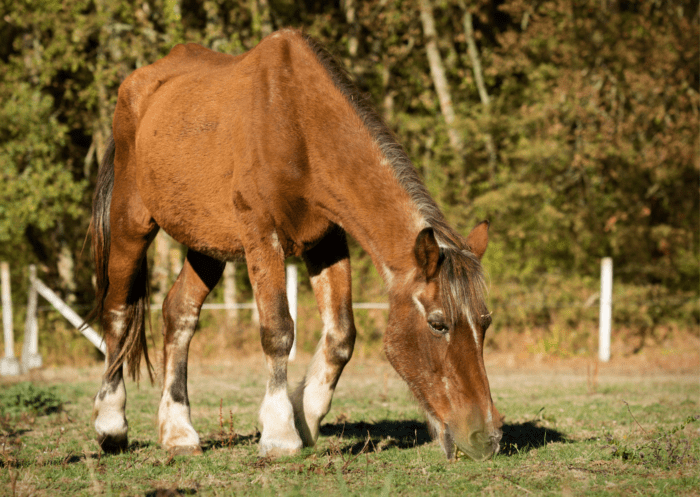
Senior feed for your old horse
Subli Seniores Priores is specially developed for horses and ponies that have problems with the feed intake of horse feeds such as hay, silage, chunks, grains and mueslis. These problems are often caused by dental problems.
- Forage and concentrate replacement
- For old horses with dental problems
- To be fed only soaked
Subli Omnia is a muesli packed with structure and fiber that can support the intestinal function of horses and ponies. Its unique composition with timothy, alfalfa, spelt flakes and chicory makes it extra high in structure and fiber.
- Additional prebiotic fiber from chicory
- Low sugar and starch content
- For extra chewing activity and longer eating time
Personalized nutritional advice?
Whether you have a question about our senior feeds or want specific feeding advice, the team at Subli is happy to help. Just fill out the contact form in or contact us by phone at 0317-499595
